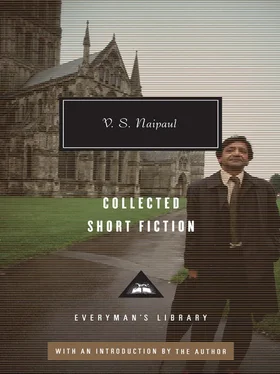I said, ‘Why? Because I knock the milk down?’
She didn’t reply, still crying for the spilt milk.
Only when we had left Port of Spain and the suburbs I looked outside. It was a clear, hot day. Men and women were working in rice-fields. Some children were bathing under a stand-pipe at the side of the road.
We got to Piarco in good time, and at this stage I began wishing I had never got the scholarship. The airport lounge frightened me. Fat Americans were drinking strange drinks at the bar. American women, wearing haughty sun-glasses, raised their voices whenever they spoke. They all looked too rich, too comfortable.
Then the news came, in Spanish and English. Flight 206 had been delayed for six hours.
I said to my mother, ‘Let we go back to Port of Spain.’
I had to be with those people in the lounge soon anyway, and I wanted to put off the moment.
And back in Miguel Street the first person I saw was Hat. He was strolling flat-footedly back from the Café, with a paper under his arm. I waved and shouted at him.
All he said was, ‘I thought you was in the air by this time.’
I was disappointed. Not only by Hat’s cool reception. Disappointed because although I had been away, destined to be gone for good, everything was going on just as before, with nothing to indicate my absence.
I looked at the overturned brass jar in the gateway and I said to my mother, ‘So this mean I was never going to come back here, eh?’
She laughed and looked happy.
So I had my last lunch at home, with my mother and Uncle Bhakcu and his wife. Then back along the hot road to Piarco where the plane was waiting. I recognized one of the customs’ officers, and he didn’t check my baggage.
The announcement came, a cold, casual thing.
I embraced my mother.
I said to Bhakcu, ‘Uncle Bhak, I didn’t want to tell you before, but I think I hear your tappet knocking.’
His eyes shone.
I left them all and walked briskly towards the aeroplane, not looking back, looking only at my shadow before me, a dancing dwarf on the tarmac.
I NEVER KNEW her real name and it is quite likely that she did have one, though I never heard her called anything but Gold Teeth. She did, indeed, have gold teeth. She had sixteen of them. She had married early and she had married well, and shortly after her marriage she exchanged her perfectly sound teeth for gold ones, to announce to the world that her husband was a man of substance.
Even without her gold teeth my aunt would have been noticeable. She was short, scarcely five foot, and she was very fat. If you saw her in silhouette you would have found it difficult to know whether she was facing you or whether she was looking sideways.
She ate little and prayed much. Her family being Hindu, and her husband being a pundit, she, too, was an orthodox Hindu. Of Hinduism she knew little apart from the ceremonies and the taboos, and this was enough for her. Gold Teeth saw God as a Power, and religious ritual as a means of harnessing that Power for great practical good, her good.
I may have given the impression that Gold Teeth prayed because she wanted to be less fat. The fact was that Gold Teeth had no children and she was almost forty. It was her childlessness, not her fat, that oppressed her, and she prayed for the curse to be removed. She was willing to try any means — any ritual, any prayer — in order to trap and channel the supernatural Power.
And so it was that she began to indulge in surreptitious Christian practices.
She was living at the time in a country village called Cunupia, in County Caroni. Here the Canadian Mission had long waged war against the Indian heathen, and saved many. But Gold Teeth stood firm. The Minister of Cunupia expended his Presbyterian piety on her; so did the headmaster of the Mission school. But all in vain. At no time was Gold Teeth persuaded even to think about being converted. The idea horrified her. Her father had been in his day one of the best-known Hindu pundits, and even now her husband’s fame as a pundit, as a man who could read and write Sanskrit, had spread far beyond Cunupia. She was in no doubt whatsoever that Hindus were the best people in the world, and that Hinduism was a superior religion. She was willing to select, modify and incorporate alien eccentricities into her worship; but to abjure her own faith — never!
Presbyterianism was not the only danger the good Hindu had to face in Cunupia. Besides, of course, the ever-present threat of open Muslim aggression, the Catholics were to be reckoned with. Their pamphlets were everywhere and it was hard to avoid them. In them Gold Teeth read of novenas and rosaries, of squads of saints and angels. These were things she understood and could even sympathize with, and they encouraged her to seek further. She read of the mysteries and the miracles, of penances and indulgences. Her scepticism sagged, and yielded to a quickening, if reluctant, enthusiasm.
One morning she took the train for the County town of Chaguanas, three miles, two stations and twenty minutes away. The Church of St Philip and St James in Chaguanas stands imposingly at the end of the Caroni Savannah Road, and although Gold Teeth knew Chaguanas well, all she knew of the church was that it had a clock, at which she had glanced on her way to the railway station nearby. She had hitherto been far more interested in the drab ochre-washed edifice opposite, which was the police station.
She carried herself into the churchyard, awed by her own temerity, feeling like an explorer in a land of cannibals. To her relief, the church was empty. It was not as terrifying as she had expected. In the gilt and images and the resplendent cloths she found much that reminded her of her Hindu temple. Her eyes caught a discreet sign: CANDLES TWO CENTS EACH. She undid the knot in the end of her veil, where she kept her money, took out three cents, popped them into the box, picked up a candle and muttered a prayer in Hindustani. A brief moment of elation gave way to a sense of guilt, and she was suddenly anxious to get away from the church as fast as her weight would let her.
She took a bus home, and hid the candle in her chest of drawers. She had half feared that her husband’s Brahminical flair for clairvoyance would have uncovered the reason for her trip to Chaguanas. When after four days, which she spent in an ecstasy of prayer, her husband had mentioned nothing, Gold Teeth thought it safe to burn the candle. She burned it secretly at night, before her Hindu images, and sent up, as she thought, prayers of double efficacy.
Every day her religious schizophrenia grew, and presently she began wearing a crucifix. Neither her husband nor her neighbours knew she did so. The chain was lost in the billows of fat around her neck, and the crucifix was itself buried in the valley of her gargantuan breasts. Later she acquired two holy pictures, one of the Virgin Mary, the other of the crucifixion, and took care to conceal them from her husband. The prayers she offered to these Christian things filled her with new hope and buoyancy. She became an addict of Christianity.
Then her husband, Ramprasad, fell ill.
Ramprasad’s sudden, unaccountable illness alarmed Gold Teeth. It was, she knew, no ordinary illness, and she knew, too, that her religious transgression was the cause. The District Medical Officer at Chaguanas said it was diabetes, but Gold Teeth knew better. To be on the safe side, though, she used the insulin he prescribed and, to be even safer, she consulted Ganesh Pundit, the masseur with mystic leanings, celebrated as a faith-healer.
Ganesh came all the way from Fuente Grove to Cunupia. He came in great humility, anxious to serve Gold Teeth’s husband, for Gold Teeth’s husband was a Brahmin among Brahmins, a Panday , a man who knew all five Vedas; while he, Ganesh, was a mere Chaubay and knew only four.
Читать дальше









